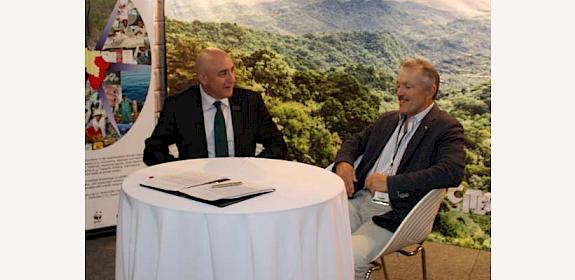Tanzania: Reshuffled cabinet should address poaching urgently
Tanzania, 27th January 2014—Conservation organizations WWF and TRAFFIC are extremely alarmed by the dramatic rise in poaching within Tanzania and call upon the recently reshuffled cabinet members to act quickly, judiciously and decisively, to eradicate the increasing poaching menace within the country.

“Alongside H.E. the President of the United Republic of Tanzania, we are gravely concerned that poaching in the country has increased to enormous levels. At the current rate, there may be very few elephants left in this country over a period of the next few years,” said WWF Tanzania Country Director Bell'Aube Houinato.
According to a press release dated 10th January 2014 from the Ministry for Natural Resources and Tourism in Tanzania, elephant census conducted in October and November 2013 at the Selous Game Reserve and its surroundings revealed that the ecosystem has lost an estimated 66 percent of its elephants to poaching in just four years. This game reserve was home to Africa’s second largest elephant population, but today, only an estimated 13,084 roam the Selous from 38,975 in 2009.
A similar situation is ongoing in the Ruaha-Rungwe ecosystem where census conducted in 1990 recorded 11,712 elephants. This number increased to 31,625 in 2009 but has since dropped to an estimated 20,090 currently indicating a decline of 36.5 percent.
According to information from the Elephant Trade Information System (ETIS), the CITES monitoring programme operated by TRAFFIC on behalf of the CITES Parties, since 2009 Tanzania has made or been implicated in 18 large-scale ivory seizures (i.e. those seizures that involved 500 kg or more in a single consignment) which are the hallmark of transnational criminal syndicates. Tanzania made only five of these seizures, whilst 13 other shipments successfully left Tanzania's ports only to later be seized elsewhere. Altogether, nearly 43 tonnes of ivory was seized in these consignments, representing the deaths of some 4,000 elephants.
Central Bank of Tanzania records indicate that the country received 6.7 million tourists from 2001 to 2012 earning the country TZS 614.38 billion (USD 380.3 million). Tanzania received 945,794 tourists in 2012 alone earning the country TZS 109, 372,608,221 (USD 68 million), breaking all previous records. In 2013, tourism in Tanzania earned more hard currency than gold.
“With these statistics in mind, it is clear that livelihoods of the many communities, that depend on wildlife based tourism via Tanzania’s various ecosystems, is under serious threat as a result of runaway poaching.
“We expect the new cabinet to pursue the poaching crisis seriously and with sustained zeal, ensuring that the rights of people and wildlife living within and around the various ecosystems in Tanzania are protected,” said Mr. Houinato.
On 12th and 13th February 2014, the London Conference on Illegal Wildlife Trade will seek commitments from key priority governments to combat the growing global threat posed by illegal wildlife trade. Heads of State and Foreign Ministers from around 50 countries, including those at the centres of the current rhino, Tiger and elephant poaching crises are anticipated to attend this high level summit convened by the UK Government under Prime Minister David Cameron and attended by HRH Prince Charles.
The conference will produce a declaration of political commitment to ensure a co-ordinated global response as well as necessary resources to turn the tide on illegal wildlife trade through improving law enforcement and the role of the criminal justice system; reducing demand for illegal wildlife products; and supporting the development of sustainable alternative livelihoods.



